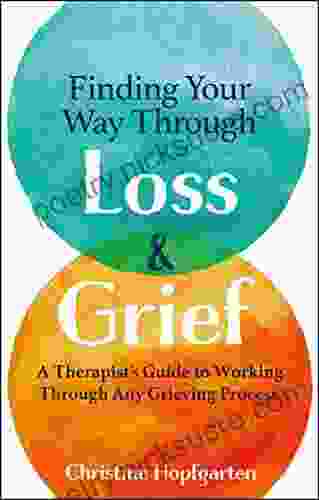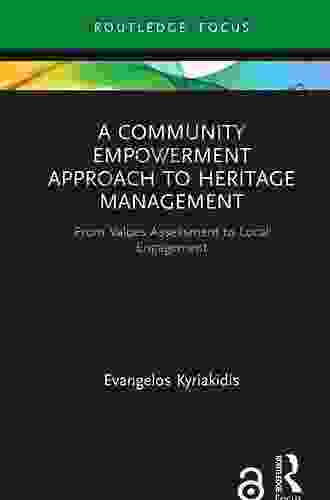Community Empowerment Approach to Heritage Management: A Comprehensive Overview


Heritage management plays a crucial role in preserving and safeguarding the tangible and intangible cultural assets of our communities. Traditional approaches to heritage management often focused on top-down decision-making, with experts and authorities defining the value and significance of heritage sites. However, in recent years, there has been a growing recognition of the importance of community involvement in heritage management. This shift has led to the emergence of the community empowerment approach, which prioritizes the active participation of local communities in all aspects of heritage management.
5 out of 5
| Language | : | English |
| File size | : | 5662 KB |
| Text-to-Speech | : | Enabled |
| Screen Reader | : | Supported |
| Enhanced typesetting | : | Enabled |
| Word Wise | : | Enabled |
| Print length | : | 142 pages |
Key Principles of the Community Empowerment Approach
The community empowerment approach to heritage management is based on several key principles:
*
*
*
*
Benefits of the Community Empowerment Approach
The community empowerment approach to heritage management offers numerous benefits:
*
*
*
*
Case Studies of Successful Community Empowerment Approaches

Numerous case studies worldwide demonstrate the success of the community empowerment approach to heritage management. Here are two examples:
*
*
Challenges to Community Empowerment in Heritage Management
While the community empowerment approach offers numerous benefits, several challenges can hinder its implementation:
*
*
*
*
Overcoming Challenges to Community Empowerment
Overcoming the challenges to community empowerment in heritage management requires a collaborative and multi-faceted approach. Here are some strategies:
*
*
*
*
The community empowerment approach to heritage management is a powerful tool for preserving our cultural heritage and promoting sustainable community development. By actively involving local communities in all aspects of heritage management, we can ensure that our heritage is valued, preserved, and celebrated for generations to come. Overcoming the challenges to community empowerment requires a collaborative effort involving heritage managers, community members, authorities, and other stakeholders. By working together, we can create a future where communities are empowered to manage and benefit from their cultural heritage.
5 out of 5
| Language | : | English |
| File size | : | 5662 KB |
| Text-to-Speech | : | Enabled |
| Screen Reader | : | Supported |
| Enhanced typesetting | : | Enabled |
| Word Wise | : | Enabled |
| Print length | : | 142 pages |
Do you want to contribute by writing guest posts on this blog?
Please contact us and send us a resume of previous articles that you have written.
 Fiction
Fiction Non Fiction
Non Fiction Romance
Romance Mystery
Mystery Thriller
Thriller SciFi
SciFi Fantasy
Fantasy Horror
Horror Biography
Biography Selfhelp
Selfhelp Business
Business History
History Classics
Classics Poetry
Poetry Childrens
Childrens Young Adult
Young Adult Educational
Educational Cooking
Cooking Travel
Travel Lifestyle
Lifestyle Spirituality
Spirituality Health
Health Fitness
Fitness Technology
Technology Science
Science Arts
Arts Crafts
Crafts DIY
DIY Gardening
Gardening Petcare
Petcare Scott Allan
Scott Allan Sean Purchase
Sean Purchase Geoff Greig
Geoff Greig James C Zimring
James C Zimring Hope Comerford
Hope Comerford Jean Barbre
Jean Barbre Ian Moulding
Ian Moulding Dorothy Ours
Dorothy Ours Jill Lepore
Jill Lepore Helen Adrienne
Helen Adrienne John Van Wyhe
John Van Wyhe Kendall Coyne
Kendall Coyne Hill Harper
Hill Harper David Soucie
David Soucie John Dunn
John Dunn Jonathan Pd Buckley
Jonathan Pd Buckley Suzanne Girard Eberle
Suzanne Girard Eberle Nancy Marie White
Nancy Marie White Kristian Berg
Kristian Berg Emily J Taylor
Emily J Taylor Anna Grafl
Anna Grafl Steve Newell
Steve Newell Jay Young
Jay Young Maggie Downs
Maggie Downs Roy M Wallack
Roy M Wallack Ann Mccallum Staats
Ann Mccallum Staats Michael Burnett
Michael Burnett Mary E Pearson
Mary E Pearson Monroe Wildrose
Monroe Wildrose Michael G Manning
Michael G Manning Matthew Cobb
Matthew Cobb Melvin Fitting
Melvin Fitting Lily Dunn
Lily Dunn Sherry B Ortner
Sherry B Ortner Todd Radom
Todd Radom Christopher Seddon
Christopher Seddon Joe Hyams
Joe Hyams Susan Spicer
Susan Spicer Shawn Shallow
Shawn Shallow Jennifer Dugan
Jennifer Dugan Howard Means
Howard Means Wendy Leo Smith
Wendy Leo Smith Margaret Jean Langstaff
Margaret Jean Langstaff Peter Watson
Peter Watson Jackie Bolen
Jackie Bolen Dr Sarita Uhr
Dr Sarita Uhr Harley Mcallister
Harley Mcallister Josephine Mccarthy
Josephine Mccarthy P M Gilbert
P M Gilbert Sharon Rowley
Sharon Rowley Barry Dainton
Barry Dainton Jemar Tisby
Jemar Tisby Maya Van Wagenen
Maya Van Wagenen Darryl Belfry
Darryl Belfry James F Twyman
James F Twyman Tony Osgood
Tony Osgood Lisa Manterfield
Lisa Manterfield Damian Hall
Damian Hall Jennifer L Lopez
Jennifer L Lopez Winton Porter
Winton Porter Sheela Raja
Sheela Raja Charlene Beswick
Charlene Beswick Mordecai Orimiladeye
Mordecai Orimiladeye Cade Courtley
Cade Courtley Cb Droege
Cb Droege Ben Shneiderman
Ben Shneiderman Philip Gibson
Philip Gibson Michael Hodgson
Michael Hodgson Marie Cirano
Marie Cirano Sara Dyer
Sara Dyer Antonio Robert
Antonio Robert Tim Cahill
Tim Cahill Stacey Williams
Stacey Williams Bob Labbe
Bob Labbe Cathy Glass
Cathy Glass Jay Spence
Jay Spence Dave Canterbury
Dave Canterbury Dave Whitlock
Dave Whitlock Craig Ramsay
Craig Ramsay J E Esslemont
J E Esslemont Anna Crowley Redding
Anna Crowley Redding Chris Bailey
Chris Bailey Peter Wacht
Peter Wacht Curtis Collins
Curtis Collins Jenny Jacobs
Jenny Jacobs M Terese Verklan
M Terese Verklan Christelle Dabos
Christelle Dabos Sara Wickham
Sara Wickham Henry Dillon
Henry Dillon Dave Hall
Dave Hall Harold Davis
Harold Davis Eleanor J Sullivan
Eleanor J Sullivan Patrick Torsell
Patrick Torsell Michael F Nenes
Michael F Nenes Daphne Poltz
Daphne Poltz Morton Manus
Morton Manus Joey Myers
Joey Myers Paul Logothetis
Paul Logothetis Dana James
Dana James David Berry
David Berry Roger Hall
Roger Hall Glen E Clarke
Glen E Clarke Anna Quindlen
Anna Quindlen Joyce Meyer
Joyce Meyer Dante Fortson
Dante Fortson Robby Weber
Robby Weber Ray Eye
Ray Eye Chris Gore
Chris Gore Ann Marie Brown
Ann Marie Brown Claire Walter
Claire Walter Sarah Stodola
Sarah Stodola Charles J Sanders
Charles J Sanders Susan Straub
Susan Straub Reinhard Kleist
Reinhard Kleist Gilbert J Grant Md
Gilbert J Grant Md Lina Beard
Lina Beard Clive Scarff
Clive Scarff Gloria Chadwick
Gloria Chadwick Stephen J Pyne
Stephen J Pyne Laurie Varga
Laurie Varga Ann Voskamp
Ann Voskamp Zach Codings
Zach Codings Chic Scott
Chic Scott Suzanne Clark
Suzanne Clark James C Scott
James C Scott Ling Seto
Ling Seto Bruce Lockwood
Bruce Lockwood Noel D Justice
Noel D Justice Mark Matlock
Mark Matlock Finn Aagaard
Finn Aagaard Frances Schultz
Frances Schultz Peter L Falkingham
Peter L Falkingham Steve Bennett
Steve Bennett Louis Van Dyke
Louis Van Dyke Mark Mckinney
Mark Mckinney Kate Mcvaugh
Kate Mcvaugh Illustrated Edition Kindle Edition
Illustrated Edition Kindle Edition Patricia Romanowski Bashe
Patricia Romanowski Bashe Annette Burns
Annette Burns College Hippo
College Hippo Les Livingstone
Les Livingstone Louise Katz
Louise Katz Worley Faver
Worley Faver Alexander L Chapman
Alexander L Chapman Katie Krimer Ma Lcsw
Katie Krimer Ma Lcsw Christine Hopfgarten
Christine Hopfgarten John Dickson
John Dickson Robin Esrock
Robin Esrock Shannon Vallor
Shannon Vallor Chase Hassen
Chase Hassen Neel Doshi
Neel Doshi L A Cotton
L A Cotton Kennedy Achille
Kennedy Achille Robert F Boszhardt
Robert F Boszhardt Richard C Schwartz
Richard C Schwartz Nicholas Thomas
Nicholas Thomas Horace Kephart
Horace Kephart Arcturus Publishing
Arcturus Publishing Jessa Stone
Jessa Stone Michael Tan
Michael Tan Freddy Silva
Freddy Silva Anna Ivey
Anna Ivey Douglas Perry
Douglas Perry Bob Madgic
Bob Madgic Joshua Shifrin
Joshua Shifrin Trevor Hartman
Trevor Hartman Margaret Paul
Margaret Paul Bert Mendelson
Bert Mendelson Michael Labossiere
Michael Labossiere Rutger Bregman
Rutger Bregman Barry Schwartz
Barry Schwartz Steve Bowkett
Steve Bowkett Stacey A Shannon
Stacey A Shannon Suzanne I Barchers
Suzanne I Barchers G Norman Lippert
G Norman Lippert Julie Creffield
Julie Creffield Anna Wood
Anna Wood Jason
Jason Christine Field
Christine Field Kyung Won Chung
Kyung Won Chung Eric Greitens
Eric Greitens Lizzie Collingham
Lizzie Collingham Dan Gardner
Dan Gardner Brian Daccord
Brian Daccord Asker Jeukendrup
Asker Jeukendrup Adil E Shamoo
Adil E Shamoo Ray Moynihan
Ray Moynihan Kristina Cowan
Kristina Cowan The Pinnacle Review
The Pinnacle Review Breeda Bermingham
Breeda Bermingham Julian Of Norwich
Julian Of Norwich Pawel Malczewski
Pawel Malczewski Justine Gregory Williams
Justine Gregory Williams John Baichtal
John Baichtal Richard A Ruth
Richard A Ruth Jackson Carter
Jackson Carter Geryn Childress
Geryn Childress Dave Hughes
Dave Hughes Larry Semento
Larry Semento Ralph Cockburn
Ralph Cockburn H M Schey
H M Schey Randy J Paterson
Randy J Paterson Paul Mendelson
Paul Mendelson Bob Cary
Bob Cary Omari Bouknight
Omari Bouknight Graham Robb
Graham Robb Barb Musick
Barb Musick Stephen Tarsitano
Stephen Tarsitano Anne Sylvie Malbrancke
Anne Sylvie Malbrancke Good Books
Good Books Stuart Tomlinson
Stuart Tomlinson Wayne C Booth
Wayne C Booth Rick Sparkman
Rick Sparkman Janine Marsh
Janine Marsh R K Agarwal
R K Agarwal Helge Kragh
Helge Kragh Heidi Kreider
Heidi Kreider John Edwards
John Edwards Creative Guy
Creative Guy Jenna Evans Welch
Jenna Evans Welch Rick Page
Rick Page Annabel Streets
Annabel Streets Luke Schumacher
Luke Schumacher Barbara Sealock
Barbara Sealock Steven Yellin
Steven Yellin Annalyn Ng
Annalyn Ng Lily Siou
Lily Siou Sally Annjanece Stevens
Sally Annjanece Stevens Richard A Swanson
Richard A Swanson Skeleton Steve
Skeleton Steve Dannah Gresh
Dannah Gresh Sean Covey
Sean Covey Ellen Painter Dollar
Ellen Painter Dollar Silvia M Lindtner
Silvia M Lindtner Sally Connolly
Sally Connolly Donna D Ignatavicius
Donna D Ignatavicius Susan G Solomon
Susan G Solomon Becky Wade
Becky Wade Will Kurt
Will Kurt Buddy Lee
Buddy Lee C W Farnsworth
C W Farnsworth Roy R Grinker
Roy R Grinker Illysa R Foster
Illysa R Foster Hanumant Deshmukh
Hanumant Deshmukh Barak A Bassman
Barak A Bassman Anna Bright
Anna Bright Tali Sharot
Tali Sharot Krista Marson
Krista Marson Gwen Mckee
Gwen Mckee Scott P Sells
Scott P Sells Adele Faber
Adele Faber Susan M Schneider
Susan M Schneider Larry Thornberry
Larry Thornberry Steven A Fino
Steven A Fino Matthew Rudy
Matthew Rudy Jeff Kuehl
Jeff Kuehl Dan Vogel
Dan Vogel Caryl Phillips
Caryl Phillips Aaron Mahnke
Aaron Mahnke Gill James
Gill James Julia Galef
Julia Galef John Murray
John Murray Jacob Ward
Jacob Ward Holly Chism
Holly Chism Katharine Beals
Katharine Beals Sandy Bodeau
Sandy Bodeau Seth Stephens Davidowitz
Seth Stephens Davidowitz Dan Koboldt
Dan Koboldt Anna Lowenhaupt Tsing
Anna Lowenhaupt Tsing Chronicle Books
Chronicle Books Helen E Lees
Helen E Lees Bernard Stiegler
Bernard Stiegler Victor Stringer
Victor Stringer Crystal Cook
Crystal Cook Richard Mcafee
Richard Mcafee John Gignilliat
John Gignilliat Darcie Little Badger
Darcie Little Badger Emmett W Hines
Emmett W Hines Margaret Rogerson
Margaret Rogerson Eddie Jones
Eddie Jones Marva Boatman
Marva Boatman Junior Health Institute
Junior Health Institute Hannah Testa
Hannah Testa Zoe Moore
Zoe Moore Daniel Isberner
Daniel Isberner L Chapman
L Chapman Ellen Dugan
Ellen Dugan Annaka Harris
Annaka Harris John O Sullivan
John O Sullivan Nisha Garg
Nisha Garg James Burke
James Burke Anna Watson
Anna Watson Bella Forrest
Bella Forrest Timothy Ellis
Timothy Ellis Isaac Fitzsimons
Isaac Fitzsimons Patricia Ladis
Patricia Ladis Ichigo Takano
Ichigo Takano Joy Dawson
Joy Dawson Bethany Saltman
Bethany Saltman Sandy Camillo
Sandy Camillo Dean Buonomano
Dean Buonomano Jay Allan
Jay Allan Lane Demas
Lane Demas Bren Smith
Bren Smith Harnarayan Singh
Harnarayan Singh Steve Olson
Steve Olson Thomas A Garrity
Thomas A Garrity Peter Hathaway Capstick
Peter Hathaway Capstick Jack Perconte
Jack Perconte Holly Bourne
Holly Bourne Lisa Randall
Lisa Randall Judy Corry
Judy Corry Julie A Ross
Julie A Ross Quinn Loftis
Quinn Loftis Steve Grant
Steve Grant Jacqueline Winslow
Jacqueline Winslow William P Young
William P Young Melanie Dickerson
Melanie Dickerson Guy Windsor
Guy Windsor Nelson Dellis
Nelson Dellis Pierluigi Barrotta
Pierluigi Barrotta Steven Munatones
Steven Munatones Timothy P Schultz
Timothy P Schultz Carl Mckeating
Carl Mckeating David Woods
David Woods Christopher T Coughlin
Christopher T Coughlin Gemma Bray
Gemma Bray Fumio Sasaki
Fumio Sasaki Todd Denault
Todd Denault Gary Chapman
Gary Chapman Earl Hipp
Earl Hipp Charles Dickens
Charles Dickens Ralph Waldo Emerson
Ralph Waldo Emerson Rebecca Carroll
Rebecca Carroll Stefan Hollos
Stefan Hollos Elisabeth Haich
Elisabeth Haich Alex Bromley
Alex Bromley Valerie Hansen
Valerie Hansen Mishka Shubaly
Mishka Shubaly Vladimir Vasiliev
Vladimir Vasiliev Tara Haelle
Tara Haelle H Jerome Chapman
H Jerome Chapman Zach Davis
Zach Davis Prime Hall
Prime Hall Karen Bassie Sweet
Karen Bassie Sweet Tim Young
Tim Young Richard Appleton
Richard Appleton Julie Plagens
Julie Plagens Mike Roberts
Mike Roberts C J Brown
C J Brown Danny Jones
Danny Jones Mikael Lindnord
Mikael Lindnord Martin N Seif
Martin N Seif Caroline Miller
Caroline Miller Mike Reilly
Mike Reilly Jenn Bennett
Jenn Bennett Joanna Wells
Joanna Wells Lexi Ryan
Lexi Ryan Stan Gibilisco
Stan Gibilisco Linda Lewis Alexander
Linda Lewis Alexander Oskar Morgenstern
Oskar Morgenstern Paulo Guillobel
Paulo Guillobel Nicholas Clapp
Nicholas Clapp June Hur
June Hur John Yates
John Yates Steve Schwartz
Steve Schwartz Frank Thomas
Frank Thomas Kristen L Mauk
Kristen L Mauk Jonathan Franklin
Jonathan Franklin Philip Reed
Philip Reed Kass Morgan
Kass Morgan Sean Bartram
Sean Bartram Miley Smiley
Miley Smiley Livia Bitton Jackson
Livia Bitton Jackson Neal Shusterman
Neal Shusterman Ann Valett
Ann Valett Marjorie Savage
Marjorie Savage Melissa Mortenson
Melissa Mortenson Jennifer Kostick
Jennifer Kostick George James Grinnell
George James Grinnell Anna Della Subin
Anna Della Subin Vittal S Anantatmula
Vittal S Anantatmula Michael Witwer
Michael Witwer Dr Harper
Dr Harper John Pullen
John Pullen Shelley Emling
Shelley Emling Linda K Miller
Linda K Miller Stefanie Japel
Stefanie Japel Rebecca A Moyes
Rebecca A Moyes Horace Freeland Judson
Horace Freeland Judson Christina Henry De Tessan
Christina Henry De Tessan Lori L Tharps
Lori L Tharps W W Sawyer
W W Sawyer Ken Robinson
Ken Robinson Fox Fisher
Fox Fisher J Scott Long
J Scott Long Genevieve Mckay
Genevieve Mckay Ruby Mcconnell
Ruby Mcconnell Jonathan R Brennan
Jonathan R Brennan Tarani Chandola
Tarani Chandola Zena Hitz
Zena Hitz James P Sethna
James P Sethna Stephanie Cave
Stephanie Cave Ford R Bryan
Ford R Bryan Malcolm S Thaler
Malcolm S Thaler Julian Havil
Julian Havil Sukhveer Singh
Sukhveer Singh Ariel Dalfen
Ariel Dalfen Randall Fitzgerald
Randall Fitzgerald Angela Saini
Angela Saini Steven G Krantz
Steven G Krantz L J Martin
L J Martin Julie C Meloni
Julie C Meloni Boye Lafayette De Mente
Boye Lafayette De Mente William Goldman
William Goldman Sally Black
Sally Black Anna Flores Locke
Anna Flores Locke Sharman Apt Russell
Sharman Apt Russell Pradeepa Narayanaswamy
Pradeepa Narayanaswamy Kathy Morey
Kathy Morey M Shawn Copeland
M Shawn Copeland Elizabeth Wissner Gross
Elizabeth Wissner Gross L J Smith
L J Smith Kalman Samuels
Kalman Samuels Matthew Locricchio
Matthew Locricchio Steve Oldenburg
Steve Oldenburg Paul Bloom
Paul Bloom Scott Shupe
Scott Shupe George Lakoff
George Lakoff Ann Zaprazny
Ann Zaprazny Tanmay Mehta
Tanmay Mehta Sajni Patel
Sajni Patel Robert Gerver
Robert Gerver Robert A Conover
Robert A Conover Robert A Cook
Robert A Cook Peter Richmond
Peter Richmond Sam Demas
Sam Demas Steven Callahan
Steven Callahan Sparknotes
Sparknotes Zach Hunter
Zach Hunter Anna B Doe
Anna B Doe Peyton Curley
Peyton Curley Johnny Chuong
Johnny Chuong Walter Mischel
Walter Mischel E R Truitt
E R Truitt Naomi Tomky
Naomi Tomky R A Salvatore
R A Salvatore Tyler Richards
Tyler Richards Martin Meredith
Martin Meredith Chris Fregly
Chris Fregly
Light bulbAdvertise smarter! Our strategic ad space ensures maximum exposure. Reserve your spot today!

 Chadwick PowellFinding Your Way Through Loss Grief: A Therapist S Guide To Working Through...
Chadwick PowellFinding Your Way Through Loss Grief: A Therapist S Guide To Working Through...
 Federico García LorcaFamily Engagement in Early Childhood Settings: A Comprehensive Guide
Federico García LorcaFamily Engagement in Early Childhood Settings: A Comprehensive Guide
 Mikhail BulgakovScholar of Magic: Art of the Adept - An In-Depth Guide to the Arcane Arts
Mikhail BulgakovScholar of Magic: Art of the Adept - An In-Depth Guide to the Arcane Arts
 Douglas FosterThese Twisted Bonds: These Hollow Vows - A Literary Masterpiece that Explores...
Douglas FosterThese Twisted Bonds: These Hollow Vows - A Literary Masterpiece that Explores... Jayden CoxFollow ·2.1k
Jayden CoxFollow ·2.1k Edward BellFollow ·11.7k
Edward BellFollow ·11.7k Dawson ReedFollow ·9k
Dawson ReedFollow ·9k Preston SimmonsFollow ·18.6k
Preston SimmonsFollow ·18.6k Devin RossFollow ·19.6k
Devin RossFollow ·19.6k Ethan MitchellFollow ·5.5k
Ethan MitchellFollow ·5.5k Adam HayesFollow ·5.8k
Adam HayesFollow ·5.8k Blake BellFollow ·11.8k
Blake BellFollow ·11.8k

 Aldous Huxley
Aldous HuxleyMorgenstern: A Classic Tale of True Love and High...
Morgenstern is a...

 Beau Carter
Beau CarterThe Oasis Guide to Asperger Syndrome
What is Asperger Syndrome? Asperger...

 Chadwick Powell
Chadwick PowellFinding Your Way Through Loss Grief: A Therapist S Guide...
Grief is a natural human emotion that we...
5 out of 5
| Language | : | English |
| File size | : | 5662 KB |
| Text-to-Speech | : | Enabled |
| Screen Reader | : | Supported |
| Enhanced typesetting | : | Enabled |
| Word Wise | : | Enabled |
| Print length | : | 142 pages |










